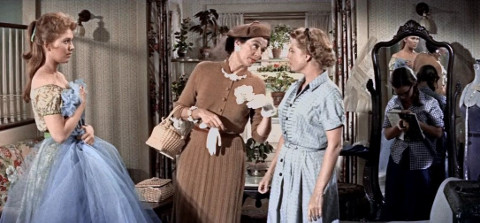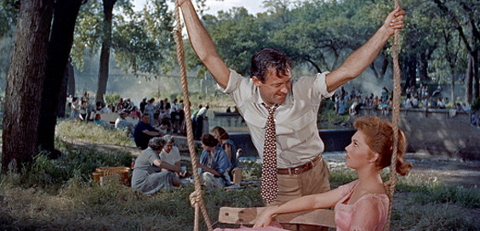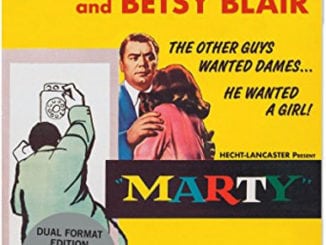Picnic (1956)
Directed by: Joshua Logan
Written by: Daniel Taradash, William Inge
Starring: Betty Field, Kim Novak, Susan Strasberg, William Holden
USA
AVAILABLE ON DUAL FORMAT BLU-RAY AND DVD: NOW, from EUREKA ENTERTAINMENT
RUNNING TIME: 115 mins
REVIEWED BY: Dr Lenera, Official HCF Critic
Unemployed drifter Hal Carter arrives on Labor Day [September 5, 1955] in a Kansas town to visit old friend Alan Benson in the hope that his rich father can give him a job. Alan’s engaged to prom queen Madge Owens. Her sister Millie is jealous of her beauty and popularity with guys, and she wants to run away to New York to “write books to shock everybody”. Meanwhile middle aged spinster schoolteacher Rosemary Sidney is desperate to marry the local merchant Howard Bevans. Madge, Millie and Rosemary all seem to take a shine to this bit of rough who is quite happy to walk around with his top off….
Considering how Vertigo is one of my favourite films, it’s strange that I’ve seen so few other films of its female star Kim Novak [I’ve seen loads of James Stewart’s], though it seems that – outside of the Man With The Golden Arm and possibly Kiss Me Stupid – Picnic might be the only other really notable picture that she made. Not initially knowing much about Picnic until I did my few minutes of research except that it was considered very sexy for its time, it was obvious within watching just a few minutes of it this was another look at sexual repression, animal heat and desperation in small town America of the Tennessee Williams mode, playwright William Inge having also been responsible for the moving romantic drama Splendor In The Grass which does have some similar thematic elements to Picnic. Even if you’re like me and watch as many old films as new ones, Picnic may come across as a slightly jarring watch because it alternates – especially in terms of its writing – between being poetic, clever and subtle, and seemingly unnatural, maudlin and heavy handed. Fortunately there’s far less of the latter, and the film is also a very poignant look at loneliness, seeing life’s chances pass by and the difficulty of escaping from not just a life that traps but also our ancestors’ demons. Its largely female-centric point of view seems very understanding and would hold up now if it was made today, what with the increasing number of films dealing with women’s issues and viewpoints with sensitivity. And – you know what – it is a pretty sexy film. I don’t know if I speak for everyone, but I can’t be the only one who, as I get older, tends to increasingly appreciate and get more excited by subtlety rather than seeing naked people fornicating all over the place.
Inge adapted both Picnic – which takes place over just 24 hours – and Splendor in the Grass from real events he witnessed back in Independence, Kansas – tragedies that befell admired young high school celebrities. He stirred up resentment when the locals recognised the original cases. Daniel Taradash expanded the play for the screen, but director Joshua Logan insisted that Inge rewrite the ending of Picnic for the movie version, and turned down several finales as being too depressing. William Holden took a pay cut for this film, earning $30,000 instead of the $250,000, because he liked the material, though he had to shave his chest so he appeared much younger than his 37 years. It was filmed initially in Salina, Kansas, where local kids kept getting in the way of the camera forcing many re-shoots, and then in and around Hutchinson, Kansas. Holden didn’t want to do his dance scene, and insisted on being paid an $8,000 “stuntman premium”, hoping that Paramount would decide not to film the scene, but to his surprise, the studio paid up and Holden had to do it. Logan took him to local roadhouses where he practiced steps in front of jukeboxes to rehearse the dance with choreographer Miriam Nelson. However, heavy thunderstorms with tornado warnings repeatedly interrupted shooting of the scene on location, and it was completed on a back lot in Burbank, where according to some sources Holden was drunk to calm his nerves. The tornado spared the set, but it devastated the nearby town of Udall, and the film crew drove their trucks and equipment there to help clean up the damage. Picnic caused a sensation with its [at least for the time] overt sexuality, and was a hit. It got nominated for nine Academy Awards and won five, and was remade for TV in 1986 and 2000.
Why does Hal angrily slam the door of the train cart he was traveling in as he leaves? I guess it’s to show that he’s angry at the world which has shat on him. A brash, womanising braggart who tends to get into trouble, we later learn that he was once a former college football star who blew it because he didn’t study, then tried an acting career in Hollywood which failed. His first act after arriving in this unnamed Kansas town is to ask the elderly Helen if he could work in her garden, and her immediately inviting this stranger in for some food will probably strike many as seeming odd today – but this is set in a [slightly] more innocent world and place – and I emphasis “slightly” because Hal’s arrival straight away causes some reactions, especially from the women folk. Beauty queen Madge and her less attractive sister Millie are both obviously taken with him, as is older teacher Rosemary – though after a few seconds of admiring him she gets embarrassed at her action. I also have a slight feeling that Bomber [played by Japanese monster movie film favourite Nick Adams with his usual “enthusiasm”], who’s after Madge, is also taken in by him – it’s only vaguely hinted at but I wouldn’t be surprised to find out that this was intended. But the emphasis is on the women. Madge is sick of being the pretty one, Millie is sick of being the smart one, and Rosemary is sick of being an old maid. You already sense that Hal’s presence will stir one or more of these women into attempting to rectify their loneliness and frustration before they leave their dreams behind. Oh – and let’s not forget Helen who cares for her sick mother and who seems have locked herself away from life’s pleasures, and Madge and Millie’s mother Flo who had to raise Millie on her own after her husband left her. She wants Madge to marry rich kid Arthur [who himself is sick of not being a winner in his dad’s eyes], so she has security, and certainly wouldn’t want either of her daughters to become attracted to a rootless stranger with no prospects.
It’s easy to tell that this is adapted from a stage play because some of the lines do come across as rather false and overly theatrical, such as Rosemary constantly introducing herself as an “old maid schoolteacher”. But the characters genuinely do feel fairly real and despite the very slow pacing interest is certainly maintained until we get to the picnic where we know things will happen. Despite no obvious suspense building with the mood remaining relaxed for most of the time, an accumulation of little details [notice the frequent cuts to small children including ones who are decidedly not happy] do make one quite on edge in a strange way while much of the filming here is quite beautiful which belies Logan’s reputation as being a stiff, theatrical director with not much movie savvy. Yes, he favours static set-ups, and there are some unintentionally amusing moments like some shots where all the characters are lined up from one edge of the screen to the other seemingly not noticing that they’re all facing in the same direction [ours]. But surely the flawed but brave experimenting with those colour filters in South Pacific and the emphasis of close-ups in Camelot suggested a filmmaker who at least had ideas, and the main dance sequence in Picnic inspired him to make lovely use of the different lanterns around, these even being introduced in a nice way as we dissolve from two people reflected in a river to the lanterns being reflected. Millie is Hal’s date while Madge is with Arthur, and Hal seems to enjoy giving Millie a fun time for possibly the first time in her life, but when Hal and Madge dance, different coloured lighting from the lanterns beautifully shines on them as the camera follows the duo. There’s clearly a strong attraction here, and add to this the tension between Rosemary and her boyfriend Howard, plus some secret whisky drinking – and you’re just waiting for things to kick off.
What’s especially interesting is that Hal doesn’t really do anything wrong – at least until after the dance – and even then the fact that he seems to have no wisdom to impart makes it interesting that he’s the catalyst for both action and reflection among others, some of which many will regard as positive, and probably more so now than when the film was made. Holden is too old for his role, especially in his scenes with Cliff Robertson as Alan who’s supposed to have been his college buddy. But my God he and Novak have chemistry and really heat up the screen. Her first appearance with her red hair streaming out of a bedroom window, and her entrance onto the dance floor which shows a woman full of confidence and sexuality for probably the first time, are both highly memorable. Also good is the scene in the car where she’s obviously thinking about Hal. Anybody who found her stiff and awkward in Vertigo [which eventually I realised actually suited her part] will be surprised by how natural she is here. Rosalind Russell as Rosemary seems to get the most praise, but she’s rather mannered, even though her insistence that Howard [a much calmer Arthur O’ Donnell who got nominated for Best Supporting Actor] must marry her is a very pathetic and touching display of neediness. Susan Strasberg also shines tremendously as Mollie, and the character is given intriguing details, such as the fact that she smokes secretly. James Wong Howe’s cinematography is often gorgeous, though it’s very obvious when things switch to a set for the dance. I wasn’t much taken with George Dunning’s much praised score though. It’s pleasant and not plastered all over the film, but is overly insistent in a few places for this particular movie, and the themes aren’t memorable except for the ‘Moonglow’ song during the chief dance. Just imagine what someone like Elmer Bernstein would have done with this.
It has its bits of stiffness and characters saying unnatural things, and doesn’t seem to be aware of the irony of Hal being continually looked at and therefore objectified because of his looks just as Madge is. But, despite its age, Picnic has much to say on the issues it deals with and gets us to think wistfully about the choices we’ve made and the chances we’ve taken. And, while the altered ending initially seemed far too happy and ‘Hollywood’ to me, on reflection it might be even sadder than the play’s finale. It could be lovely that dear old Helen is the one who steers Madge in one direction, but I reckon that the mother was right. I very much doubt that things are going to end well. Following your heart isn’t always wise at all.
Rating: 









Picnic was first released on Blu-ray by Twilight Time on Region ‘A’. Eureka have probably ported over the same restoration and given it a new encode. And, after the first few minutes which look slightly ropy [probably due to minor print damage], it’s fabulous. The colours are gorgeous and you can pick out people’s expressions even when several of them in a single shot, something that I doubt would have been possible with the DVD. Grain is evenly managed and the night time scenes hold up very well indeed. An excellent restoration. Eureka haven’t provided much in the extras for this release, though all any earlier versions managed were a photo montage, newsreel footage and, for the Twilight Time, an isolated score. But they did locate a 2010 audio interview with Novak where she answers questions relating to the film. She seems to remember it with fondness and pride, and you get the feeling that she thinks that she my have been a bit too big for her boots back then – though you have to admire any actress who would habitually remove makeup and ruin wigs so that more of her natural look would shine through. This film really needs a thorough ‘making of’, but this extra is very pleasant.
A film that may sound a bit dull and soap opera-ish but which actually has quite a lot going on in it and deals with issues that are always relevant, Eureka’s Picnic comes Recommended by the Doc.
DUAL FORMAT SPECIAL FEATURES
*1080p presentation on Blu-ray
*DTS-HD MA 5.1 or LPCM 2.0 audio options
*Optional English SDH subtitles
*Kim Novak s Hollywood Picnic [18 mins] an archival interview with the actress conducted by screenwriter and journalist, Stephen Rebello
*Original Theatrical Trailer
*PLUS: A Collector s booklet featuring a new essay on the film by Travis Crawford








Be the first to comment